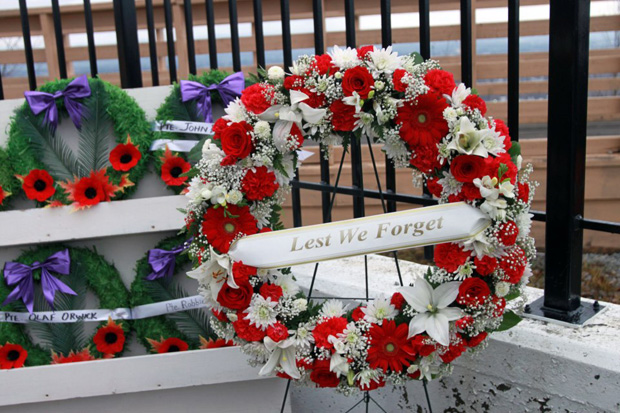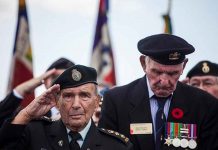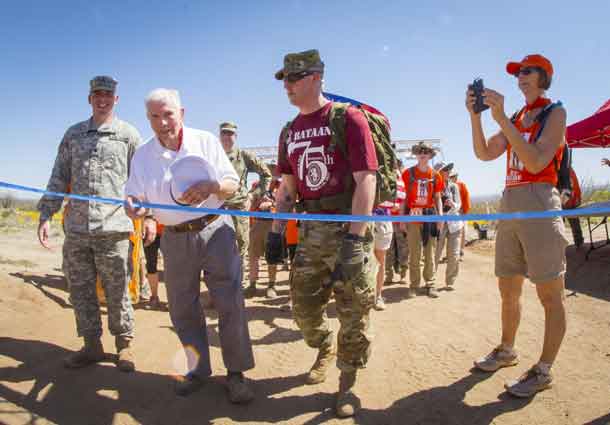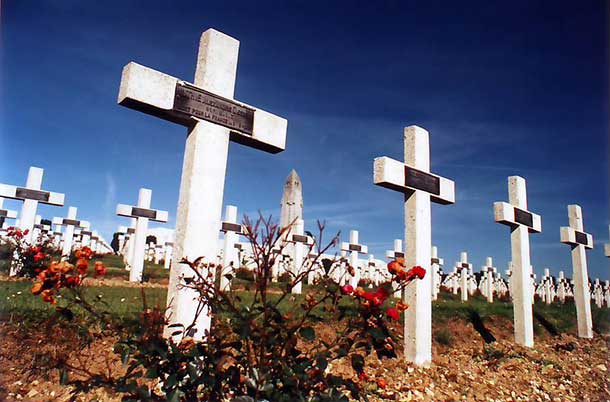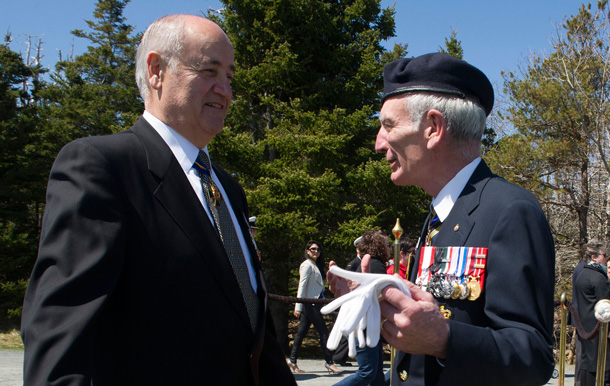Victory in Battle of the Bulge – Monty’s Win?
THUNDER BAY – HISTORY – Today, January 7 the Day in History.
During World War Two, there was a quiet battle behind the scenes between British General Bernard “Monty” Montgomery and American General George S. “Blood and Guts” Patton.
On January 7 1945 Montgomery held a press conference to declare that he was the primary force that led to the victory in the Battle of the Bulge. This key last major offensive of the German Army was halted after a major Allied counter-attack.
It was likely however that the bulk of the effort started with Genera Patton.
Allied Supreme Commander, General Dwight D. Eisenhower at a meeting of the senior Commanders of his forces on December 19 1944, realizing that the Allies could destroy German forces much more easily when they were out in the open and on the offensive than if they were on the defensive, told his generals, “The present situation is to be regarded as one of opportunity for us and not of disaster. There will be only cheerful faces at this table.”
Patton, realizing what Eisenhower implied, responded, “Hell, let’s have the guts to let the bastards go all the way to Paris. Then, we’ll really cut ’em off and chew ’em up.”
Eisenhower, after saying he was not that optimistic, asked Patton how long it would take to turn his Third Army (located in northeastern France) north to counterattack.
Patton replied that he could attack with two divisions within 48 hours, to the disbelief of the other generals present. However, before he had gone to the meeting Patton had ordered his staff to prepare three contingency plans for a northward turn in at least corps strength. By the time Eisenhower asked him how long it would take, the movement was already underway.
Patton’s forces marched and drove through the night without hot food or rest to get to the battle.
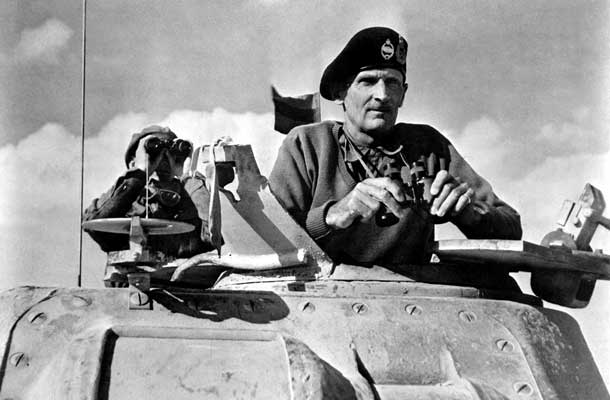
The battle between Monty and Patton had gone on throughout the war. First in Africa, then in Italy and finally in France and Germany. Both men seemed to have a certain distain for each other’s styles, and both were eager to seek publicity and acclaim for their successes.
British Prime Minister Winston Churchill, addressing the House of Commons following the Battle of the Bulge said, “This is undoubtedly the greatest American battle of the war and will, I believe, be regarded as an ever-famous American victory.
Montgomery came to see the press conference as a mistake. “Distorted or not, I think now that I should never have held that press conference. So great were the feelings against me on the part of the American generals that whatever I said was bound to be wrong. I should therefore have said nothing.” Eisenhower commented in his own memoirs: “I doubt if Montgomery ever came to realize how resentful some American commanders were. They believed he had belittled them—and they were not slow to voice reciprocal scorn and contempt.”
Major Events on January 7
- 1325 – Alfonso IV becomes King of Portugal.
- 1558 – France takes Calais, the last continental possession of England.
- 1566 – Pope Pius V is elected.
- 1608 – Fire destroys Jamestown, Virginia.
- 1610 – Galileo Galilei makes his first observation of the four Galilean moons: Ganymede, Callisto, Io and Europa, although he is not able to distinguish the last two until the following day.
- 1782 – The first American commercial bank, the Bank of North America, opens.
- 1785 – Frenchman Jean-Pierre Blanchard and American John Jeffries travel from Dover, England, to Calais, France, in a gas balloon.
- 1797 – The modern Italian flag is first used.
- 1835 – HMS Beagle drops anchor off the Chonos Archipelago.
- 1894 – William Kennedy Dickson receives a patent for motion picture film.
- 1904 – The distress signal “CQD” is established only to be replaced two years later by “SOS”.
- 1919 – Montenegrin guerrilla fighters rebel against the planned annexation of Montenegro by Serbia, but fail.
- 1920 – The New York State Assembly refuses to seat five duly elected Socialist assemblymen.
- 1922 – Dáil Éireann ratifies the Anglo-Irish Treaty by a 64-57 vote.
- 1927 – The first transatlantic telephone service is established – from New York, New York to London, United Kingdom.
- 1931 – Guy Menzies flies the first solo non-stop trans-Tasman flight (from Australia to New Zealand) in 11 hours and 45 minutes, crash-landing on New Zealand’s west coast.
- 1935 – Benito Mussolini and French Foreign minister Pierre Laval sign the Franco-Italian Agreement.
- 1940 – Winter War: The Finnish 9th Division stops and completely destroys the overwhelming Soviet forces on the Raate-Suomussalmi road.
- 1942 – World War II: The siege of the Bataan Peninsula begins.
- 1945 – World War II: British General Bernard Montgomery holds a press conference in which he claims credit for victory in the Battle of the Bulge.
- 1948 – Kentucky Air National Guard pilot Thomas Mantell crashes while in pursuit of a supposed UFO.
- 1954 – Georgetown-IBM experiment: the first public demonstration of a machine translation system, is held in New York at the head office of IBM.
- 1955 – Contralto Marian Anderson becomes the first person of color to perform at the Metropolitan Opera in Giuseppe Verdi’s Un ballo in maschera.
- 1959 – The United States recognizes the new Cuban government of Fidel Castro.
- 1960 – The Polaris missile is test launched.
- 1968 – Surveyor Program: Surveyor 7, the last spacecraft in the Surveyor series, lifts off from launch complex 36A, Cape Canaveral.
- 1970 – The Punjab Legislative Council (Abolition) Act, 1969 comes into effect.
- 1973 – Mark Essex fatally shoots 10 people and wounds 13 others at Howard Johnson’s Hotel in New Orleans, Louisiana, before being shot to death by police officers.
- 1979 – Third Indochina War – Cambodian–Vietnamese War: Phnom Penh falls to the advancing Vietnamese troops, driving out Pol Pot and the Khmer Rouge.
- 1980 – U.S. President Jimmy Carter authorizes legislation giving $1.5 billion in loans to bail out the Chrysler Corporation.
- 1984 – Brunei becomes the sixth member of the Association of Southeast Asian Nations (ASEAN).
- 1985 – Japan Aerospace Exploration Agency launches Sakigake, Japan’s first interplanetary spacecraft and the first deep space probe to be launched by any country other than the United States or the Soviet Union.
- 1989 – Prince Akihito is sworn in as the emperor of Japan after the death of his father Hirohito
- 1990 – The interior of the Leaning Tower of Pisa is closed to the public for safety reasons.
- 1991 – Roger Lafontant, former leader of the Tonton Macoute in Haiti under François Duvalier, attempts a coup d’état, which ends in his arrest.
- 1993 – The Fourth Republic of Ghana is inaugurated with Jerry Rawlings as President.
- 1993 – Bosnian War: The Bosnian Army executes a surprise attack on the village of Kravica in Srebrenica.
- 1999 – The Senate trial in the impeachment of U.S. President Bill Clinton begins.
- 2005 – The St Lawrence Lime is blown over in high winds.
- 2010 – Muslim gunmen in Egypt open fire on a crowd of Coptic Christians, killing eight of them and one Muslim bystander.
- 2012 – A hot air balloon crashes near Carterton, New Zealand, killing all 11 people on board.



